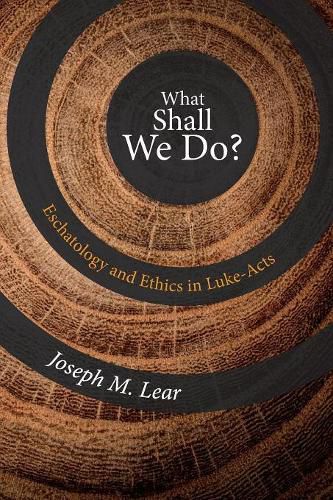Readings Newsletter
Become a Readings Member to make your shopping experience even easier.
Sign in or sign up for free!
You’re not far away from qualifying for FREE standard shipping within Australia
You’ve qualified for FREE standard shipping within Australia
The cart is loading…






This title is printed to order. This book may have been self-published. If so, we cannot guarantee the quality of the content. In the main most books will have gone through the editing process however some may not. We therefore suggest that you be aware of this before ordering this book. If in doubt check either the author or publisher’s details as we are unable to accept any returns unless they are faulty. Please contact us if you have any questions.
Since the 1960s, biblical scholars have noted a relationship between eschatology and ethics in Luke-Acts, but to date there has been no substantive study of the relationship between these themes. What Shall We Do? offers such a study. Lear observes and develops a logic that Luke–Acts presents that begins with eschatological expectation and ends with a particular pattern of life, especially with regard to possessions. He makes the bold claim that Luke has not given up on eschatological expectation. The healing of the cripple (Acts 3), Cornelius’s conversion (Acts 10), and the shipwreck narrative (Acts 27-28) are figurative stories of coming eschatological salvation. In this context, Lear demonstrates that the sharing of possessions becomes the means by which a new eschatological people is formed. At the beginning of Luke’s Gospel, John the Baptist says the true children of Abraham will escape the coming judgment because they share their possessions. The logic of this claim is worked out throughout Luke’s two volumes, culminating in barbarian Maltans becoming children of Abraham because they hospitably receive the Apostle Paul.
$9.00 standard shipping within Australia
FREE standard shipping within Australia for orders over $100.00
Express & International shipping calculated at checkout
This title is printed to order. This book may have been self-published. If so, we cannot guarantee the quality of the content. In the main most books will have gone through the editing process however some may not. We therefore suggest that you be aware of this before ordering this book. If in doubt check either the author or publisher’s details as we are unable to accept any returns unless they are faulty. Please contact us if you have any questions.
Since the 1960s, biblical scholars have noted a relationship between eschatology and ethics in Luke-Acts, but to date there has been no substantive study of the relationship between these themes. What Shall We Do? offers such a study. Lear observes and develops a logic that Luke–Acts presents that begins with eschatological expectation and ends with a particular pattern of life, especially with regard to possessions. He makes the bold claim that Luke has not given up on eschatological expectation. The healing of the cripple (Acts 3), Cornelius’s conversion (Acts 10), and the shipwreck narrative (Acts 27-28) are figurative stories of coming eschatological salvation. In this context, Lear demonstrates that the sharing of possessions becomes the means by which a new eschatological people is formed. At the beginning of Luke’s Gospel, John the Baptist says the true children of Abraham will escape the coming judgment because they share their possessions. The logic of this claim is worked out throughout Luke’s two volumes, culminating in barbarian Maltans becoming children of Abraham because they hospitably receive the Apostle Paul.